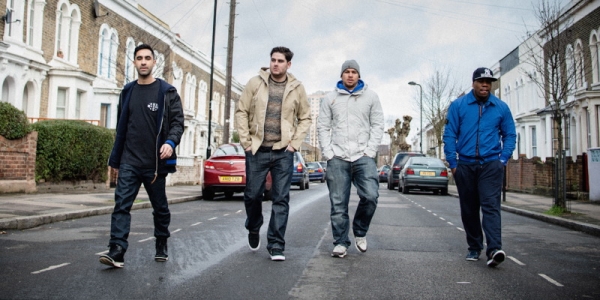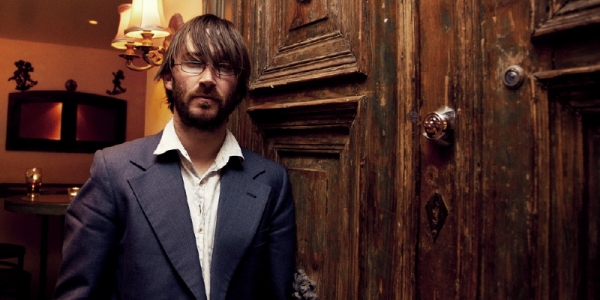“We were 30,000 copies ahead of Justin Bieber and will.i.am in the midweek [charts] so we thought we’d be alright but we couldn’t be sure,” says songwriter, producer and one quarter of Rudimental, Piers Agget, when we do finally speak. “We were ecstatic when it was confirmed we were number one again.”
Bursting out of London’s underground scene, Agget and his bandmates Kesi Dryden, Amir Amor and Leon Locksmith (aka DJ Locksmith) unofficially soundtracked the UK capital’s Olympic summer last year with debut hit Feel The Love, which also topped the charts in their homeland. It didn’t fare too badly in Australia either, reaching number three on the ARIA singles chart and topping the iTunes chart. The foursome hope their newly released debut album, Home, which features collaborations with Emeli Sandé and Angel Haze, will be similarly successful both here and there.
Although they have been labelled a drum and bass act, Rudimental’s music is a lot broader than that – as listening to Home reveals. Growing up together in the tough inner-city suburb of Hackney exposed the lads to many types of bass music including UK garage and grime but also hip hop, reggae and R&B. Agget has previously said of Rudimental’s sound, “We are Sly and the Family Stone, Todd Edwards and Dr. Dre in a cheeseburger”. It’s a cute description, but there is more besides. Dryden took classical piano lessons as a child – the band is named after the Rudiments book of piano exercises his music teacher drilled him on – and Agget was raised on his parents’ blues and jazz records.
“I was a secret jazz fan. I obviously kept it quiet at school, because it’s not the sort of thing you shout about in Hackney,” he laughs. From prominent saxophone in Feel The Love to the tiny piano flourishes in Hide, a rich musical education – both formal and informal – can be heard.
Agget reveals that the band also approach their music in a different way to many of their peers, relying on more than just a laptop and an ear for a winning 180bpm beat. “We like to mix soul and bass music and we like to mix live instruments and the electronic,” Agget says. Key to Rudimental’s success is a sense of unity – the four share ideas, develop them together and consider themselves more than just a collective of producers with similar tastes.
“We’re definitely a band. Our dream is to keep on writing music and be successful with albums and to headline Glastonbury in a few years’ time,” says Piers, revealing an ambition not normally associated with an electronic dance act. “Why not think big?”
Above all, Home wears its identity with pride. The influence of the pocket of London where the quartet grew up and the Rudimental project started shines through. Gritty vocals tell of despair and hope and paint a vivid picture of the daily trials of city life, while up-tempo beats and thick layers of different sounds express the vibrant cultural scene through which many manage to escape the drudgery.
“Hackney is very important,” says Agget. “It’s why we called the album Home.” A screenplay of Rudimental’s success could be entirely set in about 40 square kilometres of North London. Agget and Locksmith grew up on the same road together and played soccer with Dryden – the trio forming the original Rudimental lineup. Amor, who joined the band later, spent his teenage years making hip hop beats in a youth centre in nearby Camden.
Meanwhile, Locksmith was making a name for himself on pirate radio alongside some kid calling himself Dizzee Rascal. While Dryden was working at a school helping troubled kids find themselves with music, Piers was managing a studio in Tottenham and engineering tracks for the likes of Wretch 32. Many of the guest vocalists on Home, like Sinead Harnett, MNEK and John Newman, are friends of friends or talented singers that the Rudimental boys bumped into in the studios they were working in.
But success was never written on the wall for Piers, Kesi, Amir and Leon. Early on, many record companies turned them away because, as the band suspects, record execs were a bit confused as to which box to place them in (“Saxophones on a DnB record?!”). It must have been frustrating to see old friends and acquaintances, like rapper Professor Green or Simon Cowell protégé Labrinth – both old schoolmates of Dryden’s – find the success that they had craved and worked hard for. “A little, I guess,” says Agget, “But you see these guys representing where you’re from and it pushes you as well.”
Given that a specific location some 17,000 kilometres away is so central to the record and the formation of the band, I wonder why Rudimental’s music has translated so well to the Australian market. Agget offers a simple explanation.
“The location’s maybe different but I think the [Australian and British] people are very like-minded.” It may be even simpler than that – the quest for a good time is universal. With infectious hooks, layered basslines and boundless energy, Rudimental have captured it precisely. I can feel the love, can you feel it too?
BY DAVID WILD

